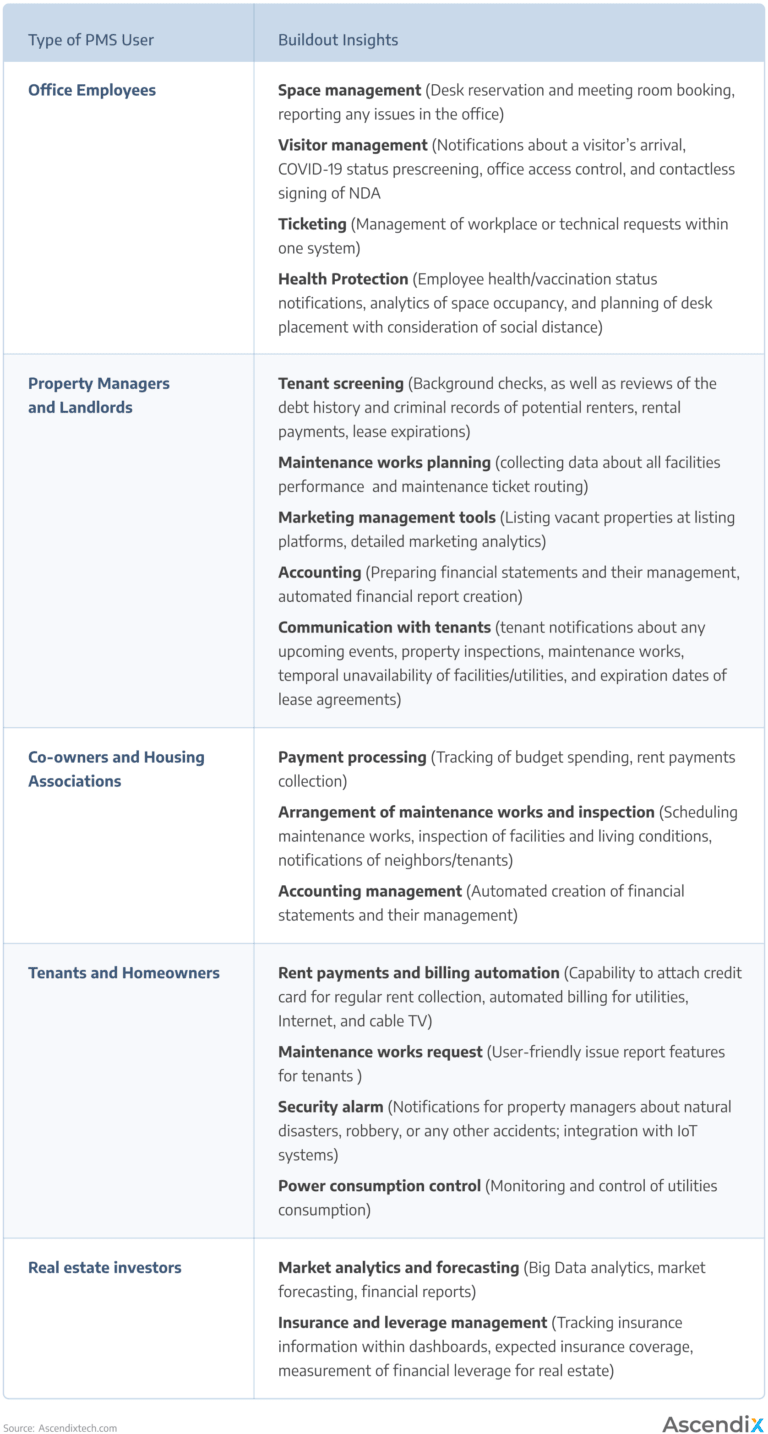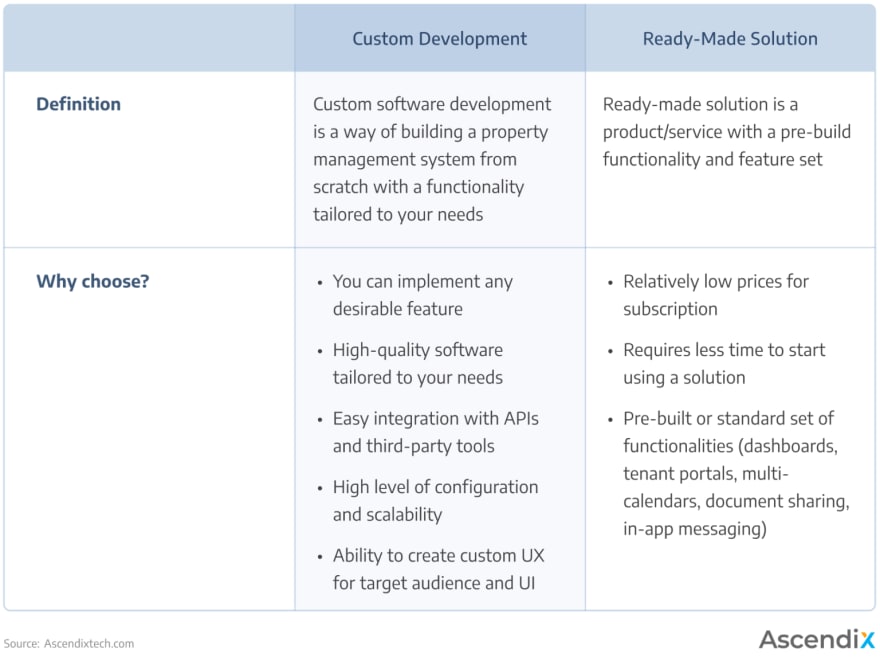Despite a huge blast of information presented on Google, property management software development is a complex topic worth talking about more and more. Why? Because property management remains an industry with a moderate level of technology adoption. To speed up the process of technology adoption within the property management industry, we decided to dig deeper into software development.
This article breaks down the myths about the high cost of software development and walks you through the process of building software for your property business.
Common Issues Custom Property Management Software Solves
Property management software (PMS) encompasses all digital solutions for property managers, landlords and real estate companies helping them organize the workflows around their rental and owned properties, including accounts, leases, documents, ticketing, maintenance and financials management.
But what problems exactly does property management software help to solve?
- Replaces Outdated Tools
Just imagine, you control 20-100 business centers using tools that don’t necessarily cover all your business needs. As a result, some tasks like collecting statistics, monitoring and tracking the buildings’ performance fall on your shoulders. And as an investor/broker/owner, you can’t get away until you conquer those chores manually, often spending more time than you can actually afford. Sounds pretty daunting, doesn’t it?
By implementing customized property management software, you get a solution that automates ALL processes within your organization. No manual work required.
- Prevents Switching Between Various Systems
The property management industry isn’t about steadfast routines. Every day is different. For example, your company manages houses, duplexes, and large multiunit buildings. Suddenly, you get 7 insurance claims coming in at once, for 7 different owners, with 7 different insurance companies. You could be elbows deep in spreadsheets, switching between various systems to deal with those claims OR you could simply rely on a centralized property management system that would prevent you from messing up with paperwork and automate all types of requests
- Simplifies the Integration Process
Here we mean integration with your existing software. For example, in large companies, the top management team doesn’t see the full picture because each department uses different software that isn’t necessarily synchronized. The best solution here is to integrate new software with existing ones to put puzzle pieces together.
Due to the differences in functionality and features, your new software might not be easily paired with your existing software (because the latter lacks support, could be outdated, etc). In this case integration is a painful and costly process.
However, the gaps between disintegrated tools within your organization may be bridged bybuilding a custom property management system, which would consolidate existing software and ease the future integrations.
Benefits of Custom Property Management Software
Speaking about property management systems, it is necessary to mention that the main value they can bring to the real estate industry is an overall optimization and automation of administrative and business processes.
Other benefits of property management software development are:
- Secure storage for all data and documentation;
- Scalability of software functionality;
- Secure data storage;
- Custom set of features tailored to your company’s needs;
- Personalized client service and engagement;
- And more!
Let’s walk through each benefit more specifically.
Overall Optimization and Automation
Automation is the best friend to the property management industry. It helps companies to optimize the following tasks:
- Lease renewals and expirations
- Asset management
- Package and delivery management
- Rent payments
- Facilitating apartment tours
- Staff recruitment
- Maintenance request management (requests for cleaning, elevators maintenance, etc.)
- Granting property access to residents and guests
- Tenant screening.
When all the mentioned above tasks are automated, you optimize the workflow and create opportunities for focusing on finding new tenants, lead generation, etc. Plus, you reduce the risk of making a mistake, since the property management system will take care of everything for you.
Data Protection
As a property manager you operate tons of data every day. The biggest part is personal info about tenants and their financials. Such sensitive data requires a high level of protection. Otherwise, in case of data leakage, you’ll be the one legally responsible.
The best way to meet all security standards is building property management software from scratch. Automated property management software allows you to store all data in one place using encryption and other security measures.
Scalability of Software Functionality
A scalable property management system is a solution with functionality that extends as your business grows. The more properties you manage, the more likely you are to expand the system. Custom property management system scales quickly and seamlessly.
Custom Set of Features
By building custom property management software, you are the one to decide what features need to be included. As a result, you get a solution tailored specifically to your business, not a black box supported by third parties.
Personalized Client Service and Engagement
Custom property management system empowers you to analyze the history of your interaction with clients to offer more personalized service. For example, you can add AI-based functionality that will offer clients properties according to their behavior on the website.
Types of Property Management Software
- Commercial Property Management Software
As commercial leases are much more complex compared to residential ones, your property management software must include tailor-made features that reflect your unique commercial real estate workflows.
Commercial property management software requires capabilities for tracking additional workflows such as property taxes, insurance, stacking plans, maintenance fees, and among a few.
- Residential Property Management for Houses, Apartments, & Multi-unit Buildings
This software assists owners, leasing companies or landlords in multiple property management, scheduling maintenance work, and handling numerous leases. Tenants can also use these solutions for online rent payment and signing digital contracts.
- Industrial Property Management Software
When you manage an industrial property, you are responsible for maintaining and inspecting it, ensuring that it complies with building codes and regulations, coordinating real estate tax reviews, bidding for vendor services, and managing staff.
The features set for this type of software focus on covering the tasks mentioned above easily and effectively.
- Special-Purpose Property Management Software
A special-purpose property is designed for specific use (e.g., theaters, sports arenas, resorts, senior care facilities, schools and universities, and places of worship). Managing this type of property requires specialized software.
Property Management Software Features
When developing customized property management software, you should consider who will use the software. Despite standard features set required in any property management system (e.g., dashboards, tenant portals, multi-calendars, document sharing, in-app messaging, etc.), the final functionality depends on the goals and expectations end-users place on it.
Below, we list approximate features property management software should have according to the type of its end user.
Custom vs Ready-Made Property Management Solutions
What’s better: to implement a ready-made solution or build a custom one? That’s a tricky question. Everything depends on your business goals and the company’s size.
We’d say that small and middle-sized companies can successfully use ready-made solutions. But for mid-to-large-sized property management organizations, those solutions may not be enough.
Around 40-50% of ready-made solutions lack customization capabilities, have limitations when it comes to integrations, and cannot be easily scaled up. Additionally, you need to consider the cost of licenses per user, which might not be cost-efficient for a big company with many employees who will need to use the software. In this case, by building and implementing custom-made PMS, you’ll save great amounts of money in the future. Moreover, you invest in a solution that can be tailored to fit your business and altered exactly how you need it.
How to Develop Property Management Software for Real Estate?
When you decide to develop property management software, you need to clearly understand the software development lifecycle (where to start, what to include, timing and cost). Here’s a roadmap to follow when planning property management software development:
- Research & Discovery phase. This is where you discuss your project requirements with the software development company you decided to partner with. During the discovery phase, you closely communicate with business analysts, product owners, and project managers (if needed). The discovery stage aims to set up a scope of work, an initial project roadmap, and use cases to define the best property management software solution for your business.
- Skillset Assessment and Proposal. You and your software development partner discuss and define the tech stack, project scope, timelines, budget, and engagement models for your project.
- Wireframing/Prototyping. At this stage, you get clickable screen prototypes and wireframes for your future property management software to test out user stories and finalize your ideas.
- UI/UX design. When you agree on prototypes and finalize ideas, the project moves to the UI/UX design stage. Here you can see the final design and test the usability of the features you’ve requested during the discovery phase. Based on your feedback, the team finalizes the tech stack selection and determines the total project estimate.
- Development. During this stage, the development team delivers mobile and/or web applications and implements the front-end and back-end functionality you require during previous stages.
- Release and ongoing support. The final step of property management software development but not the last in the software lifecycle. During this stage, the team tests, releases, and implements the software into your business. You may also sign a long-term support contract for ongoing platform updates and maintenance.
As a result of this process, you get property management software tailored to your property management business goals.





Top comments (0)
Some comments may only be visible to logged-in visitors. Sign in to view all comments.